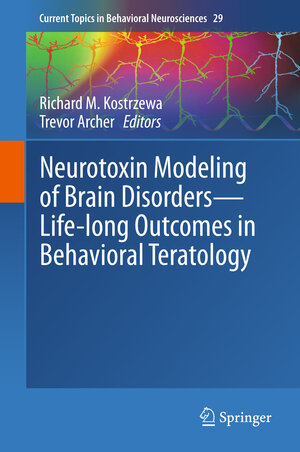
×
![Buchcover ISBN 9783319341347]()
“This informative new book, written and edited by researchers in the field of the neuroteratology, presents the most recent data regarding how perinatal insults of various types can produce effects in the brain that persist throughout the lifespan. … The editors and chapter authors provide important information about toxic exposure during pregnancy. The target audience is ‘those engaged in studies in neuro- ontogeny; the book is also important collisions involved in the care of pregnant women or children.’” (Michael Joel Schrift, Doody's Book Reviews, December, 2016)
Neurotoxin Modeling of Brain Disorders — Life-long Outcomes in Behavioral Teratology
herausgegeben von Richard M. Kostrzewa und Trevor ArcherThis book is authored by leading experts who made major discoveries in neuroteratology research focused on modeling human neural developmental disorders. Individual chapters address ADHD (attention-deficit hyperactivity disorder), Lesch-Nyhan disease, psychoses and schizophrenia, autism, and models of Parkinson’s Disease and tardive dyskinesia. The effects of perinatal stress and agonist insults on life-long outcomes are addressed, as well as the overall effects of perinatal neurotoxins on development of specific neural phenotypic systems. The book provides a unique compendium on how perinatal insults of various types can produce effects in brain that persist throughout the life span. Researchers can derive insight into experimental approaches in this research field; clinicians can develop insights into the influences of the many noxious and seemingly innocuous substances that might influence brain development in children.




